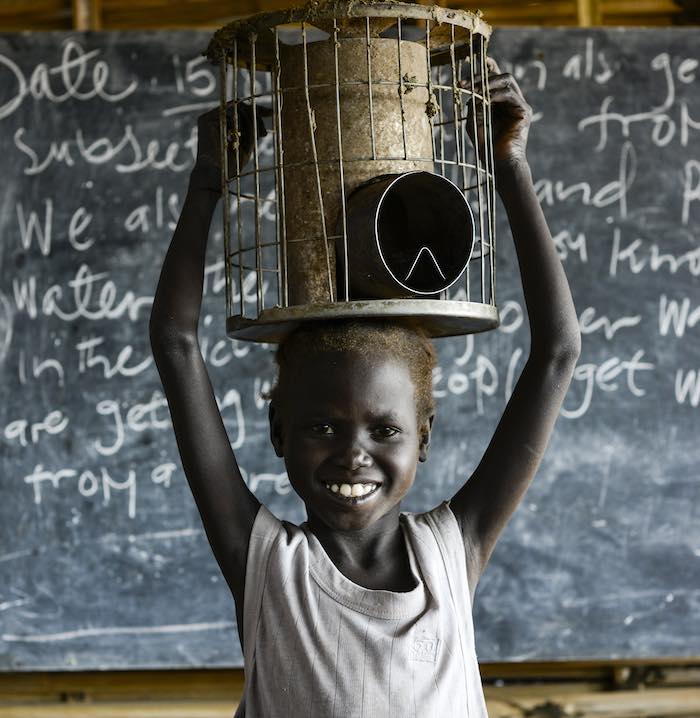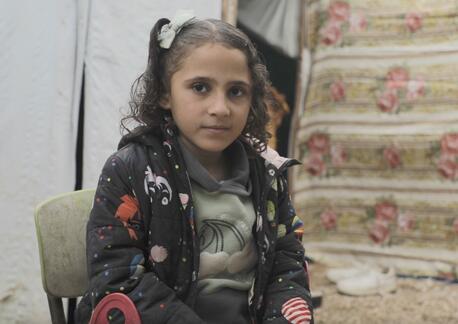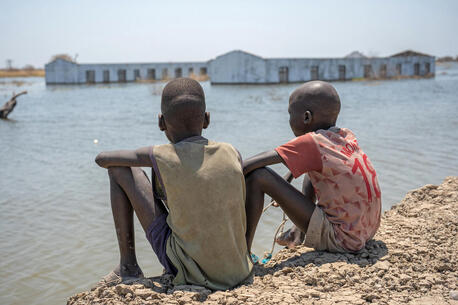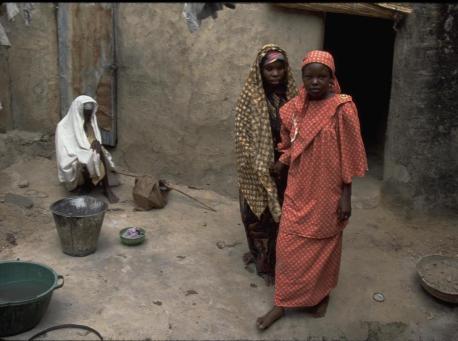It’s not about the future, but the present for South Sudan's children
It’s easy to feel overwhelmed by the challenges children face in South Sudan: ongoing fighting, displacement, hunger. But these children — so eager to learn, so eager to survive — offer hope and inspiration.
Marianna Zaichykova is a communications specialist at UNICEF South Sudan. She was formerly a specialist at UNICEF Philippines and at World Health Organization Ukraine.
It’s seven in the morning outside a school in a camp for displaced families in South Sudan. Hundreds of children are arriving, all balancing objects on their heads. Some carry empty cans of food aid, others broken buckets and small stoves. The items are not the makings of a science project. They will be used as seats in classrooms that consist of little more than thatched walls, dirt floors and a blackboard.
“My mom cooks for us on this stove and I use it as a chair in school,” says Nyaboth, a second-year elementary school student. “When I come back home after classes, she takes it away again to cook dinner for us.”
As many as 1.8 million South Sudanese children don’t go to school. Only half of those eligible for primary education attend classes. For girls, the figures are even worse: just 30 percent go to school. Only one out of 10 finishes her primary education. ©UNICEF/UN030148/Rich
Every child you meet in South Sudan has the same simple dream: “I want to go to school.” These young minds, starving for knowledge — and many for food — wake before the sun has risen to walk long, grueling kilometers barefoot to get to their dirt-floored schools by eight o’clock.
Every child in South Sudan has the same simple dream: “I want to go to school.”
On a Tuesday morning, a group of us walked into a classroom with more than 100 children in it. As we took out our cameras, all of them posed for the photos, making faces. But once the teacher walked into the classroom, the children became quiet. Their discipline and attention towards the teacher allowed them to absorb knowledge like sponges.
Even before the conflict broke out in 2013, the education system in South Sudan was struggling: there were not enough schools, not enough trained teachers and no national curriculum. With the conflict, more and more children were forced to drop out. Teachers were forced to leave schools to look for alternative sources of income.

UNICEF has supplied learning and teaching supplies in the form 'School in a box' More support is needed for school furniture and very basic renovation of the school and its classrooms. ©UNICEF/Rich
In 2013, the United Nations established civilian protection sites in Juba, Bentiu and Malakal. UNICEF launched emergency education activities to care for and protect children from abduction, militia recruitment and sexual exploitation. Schools were established at every site. They were immediately filled with the voices of young children, most of whom never had been to a school before.
Now the schools are organized and structured, providing a safe space and learning opportunities to every child. UNICEF has established partnerships to run the schools and has trained teachers to provide a truly life changing service — education.
These children have seen things that no adult, let alone child, should have witnessed.
Everyone at the civilian protection sites has been displaced from somewhere else in the country: all the teachers and all the students. Many have witnessed atrocities.
Dang Madang, a teacher in the Hope Primary School said, “These children have seen and witnessed things that no adult, let alone a child, should have witnessed. Teaching them science, math and English is the best thing we can do for them, the only thing we can do to ensure their future is safe.” Dang used to be a teacher in one of the primary schools in town, before it was occupied by an armed group which forced him to flee to the safety of a civilian protection site.

Years of war have destroyed the infrastructure of education in South Sudan. This primary school has been left to disappear into the bush. One out of every three schools in the country are either damaged, destroyed, occupied or closed. ©UNICEF/UN030164/Rich
Teachers inside and outside the civilian protection sites earn five dollars a month. This barely affords them food for their families. One of these teachers said, “We don’t have much here, but we are thankful to UNICEF, World Food Program, and other organizations for supplying food, access to medicine and opportunities to study. As long as I am here, I will do my best to give these children all the knowledge I have, to try and give them a chance to grow up safely.”
These children — so eager to learn, so eager to survive — offer hope and inspiration.
It’s easy to feel overwhelmed by the challenges children face in South Sudan: ongoing fighting, displacement, hunger. But these children — so eager to learn, so eager to survive — offer hope and inspiration. These children, with stoves on their heads at seven o’clock in the morning, whose only hope is education, should not suffer. They deserve a chance to grow up and be able to read and write and become doctors, engineers and teachers, as dedicated as their mentors, as dedicated as the aid workers in South Sudan.
The world must not give up on South Sudan. We cannot give up on the thousands of children who want to learn, to lead a meaningful life and to develop their young country.
Read about how UNICEF is reintegrating South Sudan's child soldiers here.
HOW TO HELP
There are many ways to make a difference
War, famine, poverty, natural disasters — threats to the world's children keep coming. But UNICEF won't stop working to keep children healthy and safe.
UNICEF works in over 190 countries and territories — more places than any other children's organization. UNICEF has the world's largest humanitarian warehouse and, when disaster strikes, can get supplies almost anywhere within 72 hours. Constantly innovating, always advocating for a better world for children, UNICEF works to ensure that every child can grow up healthy, educated, protected and respected.
Would you like to help give all children the opportunity to reach their full potential? There are many ways to get involved.






